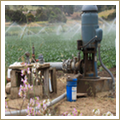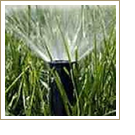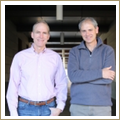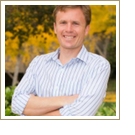 |
View this newsletter in your browser. |  |
| Research Highlights | |
| Program Updates | |
| People | |
| In the News |
| Calendar of Upcoming Events | |
| May 22 |
Lecture |
| "Reflections on Sustainable Futures: The Trade-Off Challenge" Michael Kavanaugh, Principal at Geosyntec Consultants, Inc., discusses environmental decision-making trade-offs and sustainable practices » Read more ... |
|
| May 27 |
Brown Bag Session |
| "Don't Fence Me In - Legal Barriers to Agricultural Water Transactions featuring Anne Castle" Anne Castle, Landreth Visiting Fellow and former Assistant Secretary for Water and Science, U.S. Department of the Interior » Read more ... |
|
| July 10-19 |
Travel |
| "Master of Liberal Arts 2015 Expedition to Costa Rica" Woods Senior Fellow William Durham (Anthropology) leads tour of Costa Rica » Read more ... |
|
Golden Arches, Golden OpportunitiesDo you want deforestation with your Big Mac? McDonald's bets the answer is no. The world's largest fast food chain recently announced a commitment to end deforestation caused by its supply chain. Destruction of forests and other ecosystems is one of the most powerful forces driving down populations of large plant-eating animals such as elephants, gorillas and tapirs. This could result in more frequent and intense wildfires and more disease-carrying rodents, among other downsides, according to a study co-authored by Woods Senior Fellow Rodolfo Dirzo (Biology) that offers potential solutions. Read on for more about this analysis and other unique approaches to pressing environmental challenges around the world. Sincerely, |
||
Jeffrey R. Koseff
|
Barton H. Thompson, Jr. |
|

A World Without Big Plant-Eating AnimalsSenior Fellow Rodolfo Dirzo (Biology) and a team of ecologists predict "enormous ecological, social and economic costs" from loss of large herbivores, and offer solutions. Photo credit: Kristopher Everatt / Courtesy of Oregon State University |
||

Little Prawn, Big DataResearchers supported by Woods' Environmental Venture Projects program were honored for their use of mobile data to track the spread of a parasitic disease. The project enlists freshwater prawns to control the spread of schistosomiasis in West Africa.
|
||

Record-Low Snowpack: Bad News for California, Say Stanford ExpertsCalifornia's snowpack is at the lowest level ever recorded, and long-term drought effects could be devastating. Senior Fellow Noah Diffenbaugh (Earth System Science) and Water in the West Executive Director Leon Szeptycki discuss the causes and implications. Photo credit: AP Photo/Rich Pedroncelli |
||
| For more research, see the Stanford Woods Institute quarterly Research Digest. | ||

Preventing and Resolving Groundwater ConflictsThe ongoing drought in California reinforces the importance of groundwater. A report from a recent Water in the West workshop outlines how new legislation may change the landscape of groundwater conflicts and resolution. |
||

Finding Solutions While Inspiring StudentsThe Mentoring Undergraduates in Interdisciplinary Research (MUIR) program provides useful guidance for undergraduate students and research assistance for faculty. The program recently awarded grants to projects ranging from an exploration of media impact on perceptions of climate change to an analysis of sustainability's role in business school educations.
|
||

Pricing Water for ConservationIn a Q&A with Water in the West, Woods-affiliated economics professor Frank Wolak talks about his model for developing water rate structures that meet conservation and revenue objectives in the wake of recent legal developments. Photo credit: Sadi Utra |
||

Negotiating a Climate Pact: It All Starts With Good DataSenior Fellow Robert Jackson (Earth System Science) discusses the Global Carbon Project's role in providing robust data for negotiators to consider during climate talks.
|
||

Honor for MooneyWhat do jazz pianist McCoy Tyner, the director of the National Science Foundation and Woods Senior Fellow, emeritus, Harold Mooney have in common? They all recently received honorary degrees at Duke University. Duke awarded Mooney, the Paul S. Achilles Professor in Environmental Biology, a doctorate in science for his work to build climate change consensus, among other achievements. |
||

Human Conflict Heats Up With Global WarmingMarshall Burke discusses his human-focused approach to studying climate change. Burke is an assistant professor in Earth System Science and a center fellow at Center on Food Security and the Environment. Photo credit: Stacey Geiken |
||
| Selected media coverage of the Stanford Woods Institute and its fellows, affiliated scholars and supported research |
||
Fracking Chemicals Found in Pennsylvania Drinking WaterMarketplace, May 5 |
||
Drying Up: The Race to Save California From DroughtNewsweek, April 23 |
||
Star Wars' Moisture Farming Tech Won't Save CaliforniaDiscovery News, April 16 |
||
Redistribute California's Water? Not Without a FightNPR, April 15 |
||
Hot Hands: Fingerprints of Climate change All Over California DroughtThe Washington Post, April 2 |
||
| Find Us on the Web |
Read more News and Media Coverage from the Stanford Woods Institute's fellows and affiliated faculty, including fellows with our Leopold Leadership Program. Subscribe to our other online publications. Submissions Past issues can be found online. For more information about the Stanford Woods Institute, visit our website or email us at environment@stanford.edu. |